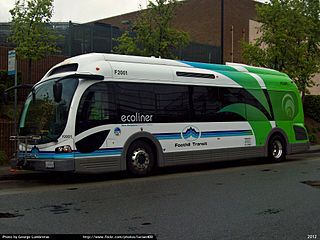From Guest Blogger Jordan: Proterra’s Electric Bus Shows a More Eco-Friendly Future For Public Transit

The use of buses in the U.S., as one of the most common public transit options, has been increasing over the past couple of years. However, buses are not an entirely eco-friendly solution, as they still emit greenhouse gases, creating air pollution.
The solution to this is having buses that run on alternative fuels. This is exactly what Proterra, a company based in Greenvile, South Carolina, has been doing for the past 10 years. It has been building zero-emission commercial vehicles (pictured above) for a while now, and its latest product is an all-electric bus that produces no emissions whatsoever. Recently, the company announced that one of its electric buses managed to travel 700 miles in one day, setting the world record for most miles traveled by an electric bus in 24 hours.
Proterra decided to run a road test with one of tis buses, on a route near its headquarters. During the test, the bus was moving at an average speed of 29 mph. Its HVAC system was running at all times while the bus was moving, which makes the feat that much more amazing, considering that these types of systems draw a lot of energy from a vehicle’s battery. When it comes to charging, the bus used overhead charging stations installed along the route to recharge its battery when it stopped to load and unload passengers. According to Proterra, the battery can be recharged in 5 to 10 minutes.
“This record offers definitive proof that all-electric Proterra buses combine all the durability and functionality of conventional buses, while significantly reducing total cost of ownership, fuel consumption and greenhouse emissions,” said Garrett Mikita, the CEO of Proterra, Inc.
Currently, there are several cities in the United States, mostly located in the western part of the country, that employ Proterra’s buses in their public transit systems. These include: Stockton and Pomona in California; San Antonio, Texas; Reno, Nevada; Worcester, Massachusetts; Tallahassee, Florida; Nashville, Tennessee; and Seneca, South Carolina. In addition to the all-electric buses, Proterra builds fuel-cell buses, which are currently in operation in Austin, Texas; Burbank, California; and Fort Lewis, Washington. This makes Proterra one of the two major players in the electric public-transport bus market in the U.S., with BYD as its strongest competitor. BYD, the Chinese car manufacturer, for its part, supplies the Los Angeles transit system with electric buses.
With two companies battling for dominance in the electric bus market, public transit in many cities across the country is set to become much more eco-friendly. However, the process won’t go smoothly, as electric buses are expected to face similar problems electric cars have been facing in the past few years on the road to become mainstream, such as high production costs and long charging times.
